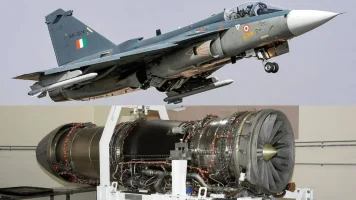- Views: 1K
- Replies: 7
India is making significant strides towards self-reliance in defence capabilities, with the Ministry of Defence (MoD) announcing the successful indigenisation of 154 out of 175 ammunition variants required by the Indian Army.
This achievement represents an impressive 88% indigenisation rate, achieved as part of a strategic 10-year plan aimed at complete self-sufficiency in firepower, a crucial element for enduring prolonged warfare scenarios.
This push towards indigenisation aligns with the government's 'Make in India' and 'Aatmanirbhar Bharat' (Self-Reliant India) campaigns, aiming to reduce India's reliance on foreign arms imports.
The MoD is prioritizing ensuring that the Indian Army can maintain operational readiness without being vulnerable to supply chain disruptions from foreign suppliers.
Among the notable achievements is the significant progress made in producing sophisticated ammunition like the Russian-origin Armour-Piercing Fin-Stabilized Discarding Sabot (APFSDS), crucial for anti-tank operations.
Known for its high velocity and armour-penetrating capabilities, the APFSDS has been a critical import until now. The indigenisation process for this ammunition is at an advanced stage, marking a promising step towards reducing import dependency.
Similarly, progress has been made with the indigenisation of the Swedish-made 84 mm ammunition used in light anti-armour weapons. This development showcases India's growing capability in producing complex munitions and highlights the collaborative efforts between defence public sector undertakings (DPSUs) and private sector companies.
Indigenising these ammunition types involves not just manufacturing but also technology transfer (ToT) and establishing production facilities. For instance, APFSDS production involves setting up a plant at Munitions India Ltd (MIL) in Pune, Maharashtra, following the acquisition of technology from Russia.
This move is expected to bolster India's defence manufacturing sector, generate employment opportunities, foster technological innovation, and reduce the outflow of foreign exchange.
Ministry sources emphasize that these efforts are part of a long-term vision where the Indian Army aims to be completely self-sufficient in its ammunition needs. This roadmap includes indigenous production and enhancing the quality and reliability of these products to match or exceed imported equivalents.
The strategic importance of this indigenisation drive cannot be overstated. With global supply chains becoming increasingly unpredictable, especially during conflicts or geopolitical tensions, having a robust domestic production capability ensures that India can sustain its military operations without external dependencies. This self-reliance is particularly critical in scenarios where prolonged engagement might be necessary, such as in border disputes or defensive operations.



